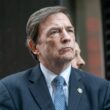As President Trump’s ramped-up immigration enforcement against students this summer sparks back-to-school anxiety, New York City’s schools chancellor made an emotional appeal to parents on Wednesday: Please send your children to school.
During a rare appearance at the New York Immigration Coalition’s annual “Know Your Rights” press conference, held just more than a week before the first day of classes, Melissa Aviles-Ramos tried to reassure immigrant families alarmed by ICE detentions while promoting resources available to those at risk of deportation.
“New York City Public Schools stands with all of our families, regardless of background and immigration status,” the chancellor said outside the department’s central offices. “Let me assure you, our schools are safe places. They are welcoming places where your child will be cared for and valued.”
“We are committed to student safety above all else,” she continued. “Again, I want to reaffirm our support for all families. We are here for you.”
In the final weeks of the last school year and over the summer, several cases of local students detained by Immigration and Customs Enforcement have dominated headlines, including those of Brooklyn transfer student Mamadou “Mouctar” Diallo and Queens elementary student Dayra. The 6-year-old girl was deported to Ecuador with her mom, who said she had fled from domestic violence in that country.
The actual number of local students impacted by federal immigration enforcement is likely much higher, with reports indicating that dozens of minors were arrested this summer by ICE agents in New York City and the metro area, with most quickly deported.
Aviles-Ramos said city schools are hosting resource fairs, opening “care closets” with food and clothing, and training school staff and volunteer parents on protocols and resources to help other public school families. The department also places staff on its payroll in homeless shelters, and convenes monthly meetings on immigrant students and trauma support, school transportation and health issues.
When a student or their family member is detained, the chancellor said schools can make introductions to groups that offer legal support or other resources. School-based teams of principals, parents and teachers have also provided letters of support, and school officials have advised the city’s Law Department in drafting amicus briefs.
“Attacks on New York City families have fueled fear within our communities,” Vlad Tlali from the New York Immigration Coalition said. “Parents are worried that enrolling their children could expose their families to risk, and that is why we are here today: To make clear to all families — schools remain safe spaces for learning.”
The sentiment was echoed by union officials and immigrant education advocates repeatedly during the rally.
“It personally makes me ill to know that students are afraid, families are afraid to send their children back to our schools,” said Mary Vaccarro, a vice president at the United Federation of Teachers.
The union rep said undocumented families have reservations about providing schools with their emergency contact information, which teachers use if a student is out sick to contact their family or to otherwise involve parents in their children’s education. She promised UFT members won’t share that information with the federal government.
“We need the information, and we know that families are afraid to give that information right now,” she said. “And I want to assure you, representing 200,000 of our members, that we will not give any of that information outside of the school.”
Vaccarro also vowed that teachers are ready to help students travel to and from school safely: “Families have shared with me… They’re afraid to put their child on the bus because they don’t know who’s going to be waiting on the other side when they arrive at school. I can, once again, assure you that our teachers will be there — our paraprofessionals, our social workers, our guidance counselors will be there — receiving your child on the other side as soon as they arrive at school, and walk them right into that school.”
On top of deportation fears, advocates raised concerns about the quality of instruction that immigrant students receive. Most recently, the Trump administration revoked 40 pages of federal guidance on students who do not speak English fluently. While the move did not appear to change the law, it may impact how strictly it is enforced.
Rita Rodriguez-Engberg, who leads work on immigrant education for the legal and advocacy group Advocates for Children, reminded parents of their rights to an appropriate education for their children.
“We want to make sure that parents do not feel like they’re a burden to the school,” Rodriguez-Engberg said. “We don’t want them to be afraid to go to their school to ask for help: This is what we have been hearing from our newcomer families.”
“Please don’t be afraid, because you all have rights,” she added. “They are federal rights and we want to make sure that your children are able to participate in school, and make progress every year, as the law says they’re entitled to do.”
The first day of school is Sept. 4.








